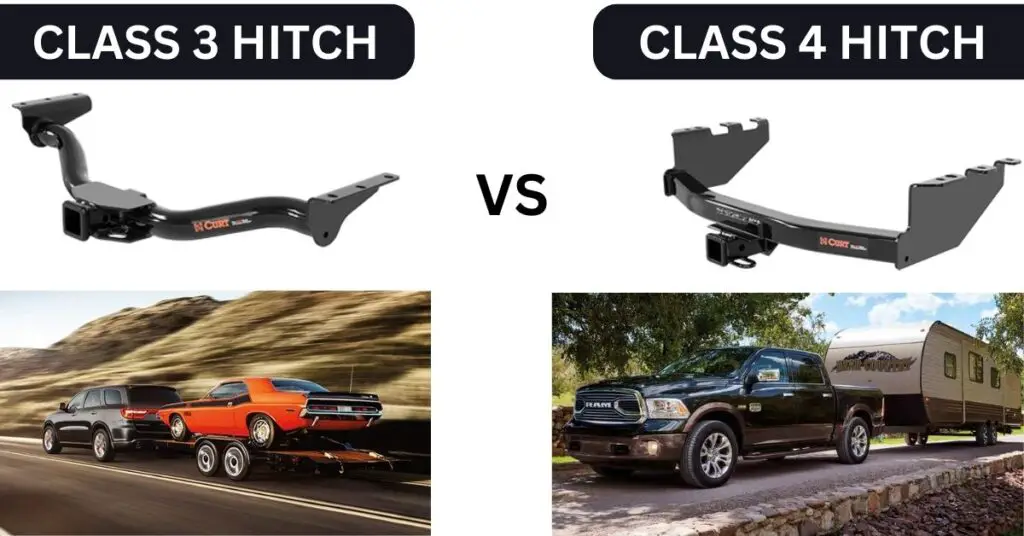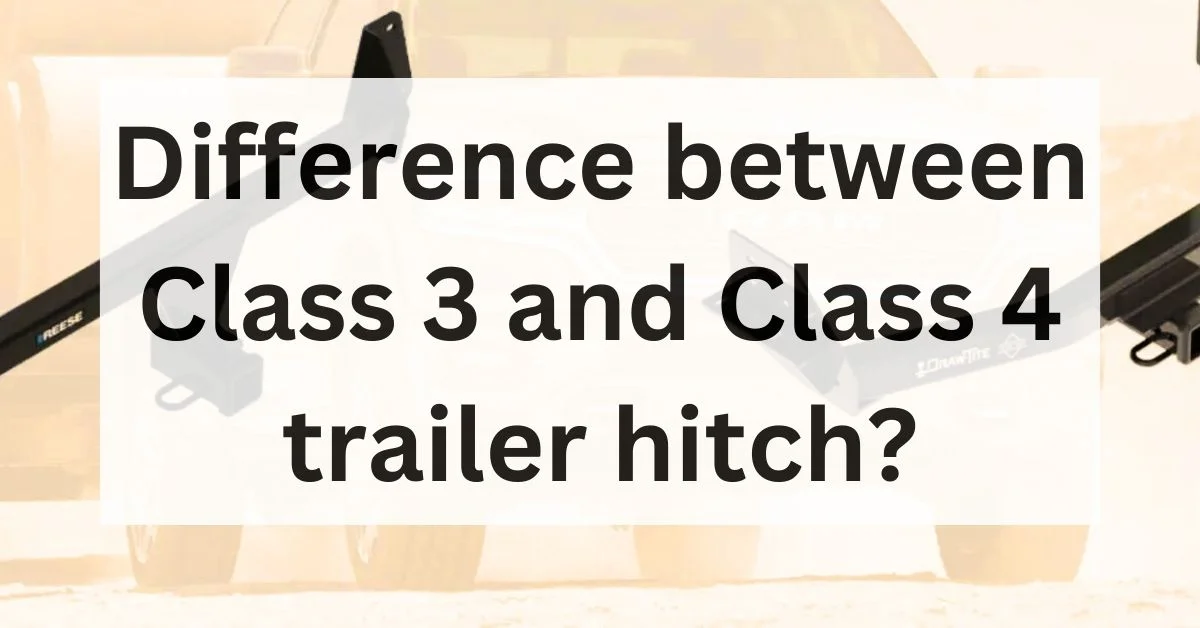Hitch receiver types and sizes are important when you are towing trailers, campers, RVs, or other equipment with your vehicle. There are different trailer hitch classes available in the market with unique characteristics.
Table of Contents
It depends on your vehicle type and requirements whether to choose between Class 3 or Class 4 Hitch. For instance, if you have a pickup truck, it is better to use a Class 4 hitch as it offers max towing of up to 10,000 lbs. For SUVs, you can use Class 3 hitches offering a towing capacity of up to 8,000 lbs.
Class 1, Class 2, Class 3, Class 4, and Class 5 are the type of hitch classes that are used to tow trailers and loads. In this article, we will explore the Class 3 and Class 4 trailer hitch with their importance and key differences.
Class 3, Trailer Hitch
Class 3 trailer hitches are among the common trailer hitches that are widely used for SUVs, and crossover vehicles. Besides, it is also used for quarter-ton half-size pickup trucks and half-ton full-size pickup trucks.
The Class 3 Trailer receivers can tow up to 8,000 lbs when properly equipped.
Class 4 Trailer Hitch
Like Class 3, the Class 4 Trailer Hitch is also widely used for SUVs, quarter-ton half-size pickup trucks, half-ton full-size pickups, all ¾ ton & full-ton trucks manufactured before 2008, and various EV Pickup trucks.
Talking about the towing capacity, the Class 4 receiver can tow up to 10,000 lbs when properly equipped.
What is the difference between Class 3 and Class 4 Trailer Hitch?
As discussed above, Class 3, and Class 4 trailer hitches are the most commonly used tow receivers. The major difference between these hitches is the towing capacity.
Let’s explore all the differences between Class 3 and Class 4 Trailer Hitch.
Towing Capacity
As per the towing capacity is concerned, the Class 4 Trailer hitch offers more capacity than Class 3. Class 3 Trailer Hitch can tow up to 8,000 lbs whereas Class 4 hitch is capable of towing up to 10,000 lbs.
You can use Class 3 Tow hitches for your SUVs, Crossovers, and lightweight pickups. However, for heavy towing with full-size pickup trucks, you need a Class 4 Trailer hitch.
| CLASS 3 HITCH | VS | CLASS 4 HITCH |
| Up to 8,000 lbs | TOWING CAPACITY | Up to 10,000 lbs |
| Up to 12,000 lbs | WEIGHT DISTRIBUTION CAPACITY | Up to 12,000 lbs |
| Up to 1,200 lbs | WDTW Capacity | Up to 1,200 lbs |

Receiver Type, and Tongue Weight
Class 3 trailer hitch features a 2-inch receiver tube. The tongue weight (amount of weight a trailer puts on the towing vehicle’s trailer ball) handling capacity is 800 lbs.
On the other hand, the Class 4 Trailer hitch can handle up to 1,000 lbs of tongue weight. The type of receiver used on the Class 4 hitch is a 2-inch receiver box.
Uses
Class 3 Trailer hitch is mostly used as a receiver hitch class equipped on full-size pickup trucks, SUVs, and crossovers. This hitch can be found on the trucks available with a tow trailer package. With a Class 3 trailer hitch, your tow vehicle can easily tow motorboats, campers, landscape trailers, or other equipment below 8,000 lbs.
Class 4 Trailer hitch is mostly used on full-size heavy-duty pickup trucks. This hitch class is perfect for heavy-duty hauling. With a weight distribution (WD) system, you can expect your truck to tow up to 14,000 lbs.
Conclusion
We explored the major difference between the Class 3 and Class 4 trailer hitch in the discussion above. There are 5 trailer hitch classes available that are capable of handling distinctive towing jobs.
The key difference between the Class 3 and Class 4 Trailer Hitch is the maximum towing capacity. Your light-duty vehicle including SUVs and crossovers can tow up to 8,000 lbs with the Class 3 Trailer hitch.
On the other hand, Class 4 trailer hitches are used on heavy-performance pickup trucks. With this hitch, pickup trucks like F-150, Chevy Silverado 1500, RAM 1500, and others can tow up to 10,000 lbs.
Stellan Carter is an accomplished writer, entrepreneur, and avid Ford Raptor owner. As a co-founder and content contributor for this renowned blog website, Stellan brings a wealth of knowledge and expertise to the automotive industry. When he's not behind the wheel of his beloved Ford Raptor, Stellan can be found exploring new terrains, capturing the essence of his automotive adventures through his camera lens.

